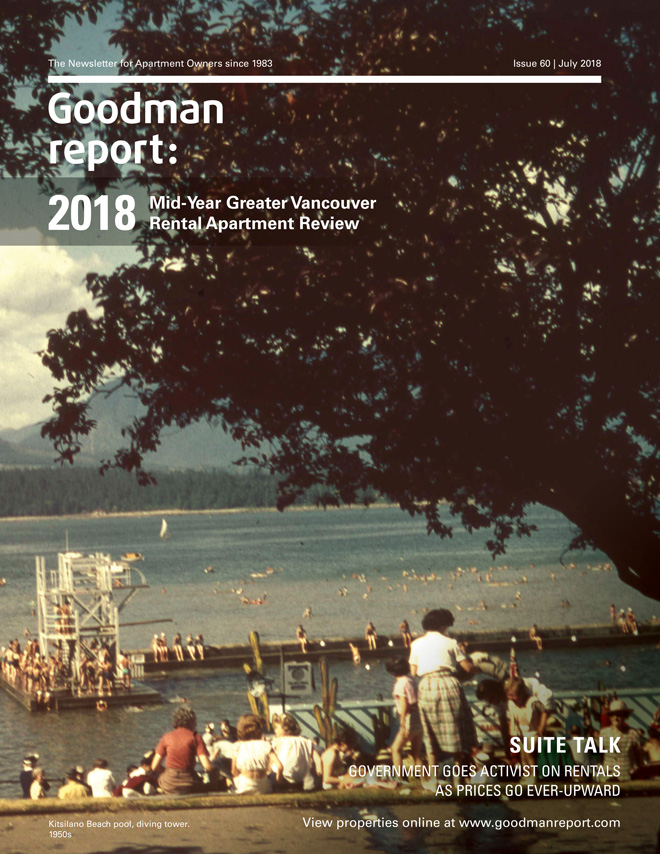The market retains its lustre
Goodman Report
So much for the anticipated drop-off in demand and pricing for Metro Vancouver’s rental apartment sector. Despite the B.C. government’s highly publicized efforts to impact real-estate values negatively by extracting tax dollars from almost all known transactions and sources, the market in the first six months of 2018 versus 2017 is very much alive, if not thriving.
The forces behind the rental market’s enduring strength are numerous. The most apparent is that Metro Vancouver’s low unemployment reflects a strong local economy. Tenant demand remains near insatiable, and with the erosion in homeownership affordability, growing numbers of people are resigned to renting. Vacancy rates are tracking less than 1% across many of the region’s urban centres, with rents rising at a rapid clip. Our research indicates that little new rental supply is making its way to the market. Additionally, high in-migration including a record volume of foreign students and low long-term mortgage rates are critical factors underpinning the rental asset class.
The only restraint to greater sales activity is the constrained supply of listings. Eager buyers are readily snapping buildings up at or near market. Of late, however, we observe a growing fickleness on the part of wary investors, who shun certain offerings whose asking price is positioned well above perceived market.
With respect to supply challenges, as evidenced by the modest number of yearly transactions, owners of multifamily rentals are generally a content lot, not typically prone to selling. Many are long-term owners who either self-manage or possess able property management. Furthermore, they’ve been fortunate beneficiaries of extreme value escalation within the past twenty years and are understandably not anxious to cut cheques to the CRA. Thus their business rationale for parting with rewarding rental assets are diverse, often complex. The decision may be triggered by estate planning issues, family dynamics, illness, liquidity requirements caused by trading up, a move away from Metro Vancouver or – of late – offers from developers that are so extraordinarily compelling that a “yes” is a given.
Staying in the loop
Owners of older buildings currently not zoned to benefit from potential development as well as typical apartment owners who stand to reap significant value well over market with immediate development prospects have urged the Goodman Report to continue to provide ongoing status updates of new rental initiatives in their respective communities throughout Metro Vancouver. We’re pleased to furnish this latest information.
What has emerged from our latest internal survey of suburban activity is the staggering success of Coquitlam, with its municipal focus on new rental development. Spurred on by 15 separate projects in the Lougheed and Burquitlam areas, Coquitlam anticipates the addition of 2,402 new rental units. Burnaby, in second place, has 1,700 units in play derived from 8 separate projects, while an aggressive City of North Vancouver campaign now has 15 projects on the go expected to generate 1,336 new rental units.
While most suburban communities have been stellar in their efforts to create new rental housing, Delta, Richmond and White Rock remain most conspicuous in their lack of success in providing a meaningful development environment to address pent-up demand. Meanwhile, despite a vastly higher population, housing programs receiving much ballyhoo and a ten-year head start on new rental construction, Vancouver itself has only 7,316 units in the pipeline: a testament to the less-than-stellar effectiveness and lack of political will of Mayor Robertson’s administration.
